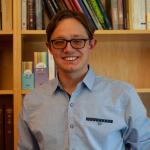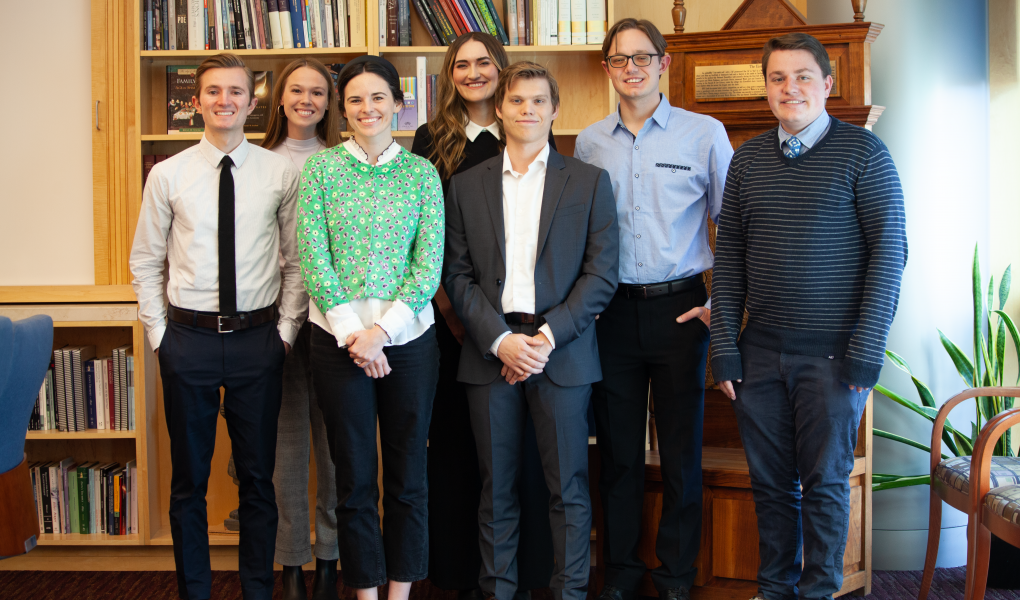The Humanities Center held its 10th annual Undergraduate Research Symposium on Friday, October 21st at 3:00 PM in the Dean’s Conference Room. This year’s event featured 7 undergraduate students from the College of Humanities and their research.
Madilyn Abbe: “Safe in the Eye of the Storm”: A 20th Century Adaptation of Safe Slave Spaces in Colson Whitehead’s The Intuitionist
 This essay explores the interplay between bodies and buildings in The Intuitionist as a social commentary on the lack of safety for black women in contemporary cities. To illustrate the danger the black female body experiences, Whitehead adopts from the antebellum trope of safe slave spaces. The contemporary spaces declared safe for black women in the novel mimic the inherent problem of antebellum safe slave spaces—inhibited mobility and temporariness. These limitations indicate that both spaces can only offer the female black body limited protection. The crux of my argument centers on the solution The Intuitionist lauds as the resolution to all the city’s social problems: the black box, a space that decomposes the body into untouchable immateriality. Far from being a plausible solution, an evaluation of the cost exacted on the black body reveals that the black box is ultimately a damning critique of the lack of safety afforded black bodies in 20th century urban space. Because the body is integral to the black experience, my reading identifies the text’s solution not as the one overtly presented, but one mentioned in passing: the taxi dance hall, a space that allows for recognition of the body and peaceful cohabitation among races.
This essay explores the interplay between bodies and buildings in The Intuitionist as a social commentary on the lack of safety for black women in contemporary cities. To illustrate the danger the black female body experiences, Whitehead adopts from the antebellum trope of safe slave spaces. The contemporary spaces declared safe for black women in the novel mimic the inherent problem of antebellum safe slave spaces—inhibited mobility and temporariness. These limitations indicate that both spaces can only offer the female black body limited protection. The crux of my argument centers on the solution The Intuitionist lauds as the resolution to all the city’s social problems: the black box, a space that decomposes the body into untouchable immateriality. Far from being a plausible solution, an evaluation of the cost exacted on the black body reveals that the black box is ultimately a damning critique of the lack of safety afforded black bodies in 20th century urban space. Because the body is integral to the black experience, my reading identifies the text’s solution not as the one overtly presented, but one mentioned in passing: the taxi dance hall, a space that allows for recognition of the body and peaceful cohabitation among races.
Holden d’Evegnée: “Legend Still Holds Secret the Key:” Animism and Dialogic Witnessing in Véronique Tadio’s Queen Pokou and Toni Morrison’s Beloved.
 Many critics have observed how African novels use elements such as mythology, rhetorical questions, dialects, etc. in their texts to recreate elements from oral legends, but this neglects to take into account how animist literature invites readers to renegotiate the meaning of old stories by becoming responsible for its future transmission. In this paper, I argue that the novels Queen Pokou: A Concerto for a Sacrifice by Veronique Tadjo and Beloved by Toni Morrison use animism as a literary paradigm to recreate the experience of participating in oral literature. Tadjo’s and Morrison’s novels restructure founding stories from their communities’ pasts to create fluid texts that resist overly historical interpretation. Animism is what gives African oral literature a unique ability to fluctuate and modify itself according to each generation. This fluidity preserves the continuity of a community’s identity. In this way, both works of the authors deconstruct history and writing to provide an African form of interrogating the past and shaping the present. This form of interrogation is what I call dialogic witnessing: the act of participating in the past as a witness and the responsibility to become a storyteller for the future. As examples of Animist written literature, Queen Pokou and Beloved bridge the gap between the Western novel and African oral traditions by restructuring the audience’s engagement with texts and the past. They use animism to recreate the performative, communal nature of oral traditions in a written medium.
Many critics have observed how African novels use elements such as mythology, rhetorical questions, dialects, etc. in their texts to recreate elements from oral legends, but this neglects to take into account how animist literature invites readers to renegotiate the meaning of old stories by becoming responsible for its future transmission. In this paper, I argue that the novels Queen Pokou: A Concerto for a Sacrifice by Veronique Tadjo and Beloved by Toni Morrison use animism as a literary paradigm to recreate the experience of participating in oral literature. Tadjo’s and Morrison’s novels restructure founding stories from their communities’ pasts to create fluid texts that resist overly historical interpretation. Animism is what gives African oral literature a unique ability to fluctuate and modify itself according to each generation. This fluidity preserves the continuity of a community’s identity. In this way, both works of the authors deconstruct history and writing to provide an African form of interrogating the past and shaping the present. This form of interrogation is what I call dialogic witnessing: the act of participating in the past as a witness and the responsibility to become a storyteller for the future. As examples of Animist written literature, Queen Pokou and Beloved bridge the gap between the Western novel and African oral traditions by restructuring the audience’s engagement with texts and the past. They use animism to recreate the performative, communal nature of oral traditions in a written medium.
Jackson Hawkins: Monads and Bodies: The World As Leibniz Sees It
 Preoccupation with “atoms,” the basic units of matter, is one of the oldest phenomena of human intellectual life, dating back to Greek antiquity. Throughout history and into the present era, the question of what lies at the foundation of the observable world has been a continual source of fascination to inquiring minds. Contrary to the modern tendency to restrict the analysis of atoms to “hard physics,” for the majority of human history this realm of study was considered to belong to the domain of metaphysics, a subfield now viewed as a type of philosophical study. Indeed, the question of the atom’s importance to the human experience was once a prominent concern for the thinkers who contemplated it, while this type of reflection is lost on most modern physicists.
Preoccupation with “atoms,” the basic units of matter, is one of the oldest phenomena of human intellectual life, dating back to Greek antiquity. Throughout history and into the present era, the question of what lies at the foundation of the observable world has been a continual source of fascination to inquiring minds. Contrary to the modern tendency to restrict the analysis of atoms to “hard physics,” for the majority of human history this realm of study was considered to belong to the domain of metaphysics, a subfield now viewed as a type of philosophical study. Indeed, the question of the atom’s importance to the human experience was once a prominent concern for the thinkers who contemplated it, while this type of reflection is lost on most modern physicists.
Perhaps the most unique way of understanding the fundamental building-blocks of reality is found in the metaphysical system of the German rationalist philosopher Gottfried Leibniz, according to whom the universe is made up of atoms which not only make up material objects, but have souls, perceptions, and destinies of their own. My research centers on the historical development of Leibniz’ understanding of the atom, and the intriguing way in which he described its relation to human beings and other living organisms. Moreover, I argue that a disconnect exists between Leibniz’ earlier approach to the question and his more famous line of reasoning in his later essay, the Monadology, creating a difficult interpretive dilemma for admirers of his philosophy. All told, not only does Leibniz’ philosophical system amount to an incredible piece of intellectual history, but it traces a novel way of understanding nearly every aspect of the human world.
Rachel McDonald: Goalkeeping or Gatekeeping? A Lexical Analysis of Sexism in Italy’s Female National Football League
 The Italian language as a echo of its country’s culture has contributed to the historical alienation of women in sports as well as reinforcing the gender-based discrimination that occurs in Italian soccer today. Rooted in a defiance of Italy’s developing Fascist state, the Women’s Soccer Group established in 1932 contradicted Mussolini’s emphasis on the value of women lying solely in their reproductive capabilities. “Fascist Italy needs good mothers, not ‘virago footballers’” Lo Schermo Sportivo, a Milanese sports journal, claimed in a 1933 article. The propagation of negative sentiment towards Italian women in sports not only disbanded the Women’s Soccer Group, but also maintained its absence for a subsequent 35 years. It is with these origins in mind that I conducted research through social media tracking, interviews, and academic study in order to understand language’s impact more fully on Italian women’s soccer. In monitoring specific hashtags across various social media platforms over a period of 8 months, the statistics concluded that Italian women’s soccer was referred to negatively in 20.2% of mentions, as opposed to 14.6% positive references. The idea that female soccer continues to be spoken of unfavorably is reflected in the amendment scarcely made in 2022, allowing the Italian women’s soccer league to become professional and its salary cap removed. Though language continues to mirror a culture cemented in its hegemonic foundations, it may also positively influence the perception of Italian women in sports, which then transforms their reality.
The Italian language as a echo of its country’s culture has contributed to the historical alienation of women in sports as well as reinforcing the gender-based discrimination that occurs in Italian soccer today. Rooted in a defiance of Italy’s developing Fascist state, the Women’s Soccer Group established in 1932 contradicted Mussolini’s emphasis on the value of women lying solely in their reproductive capabilities. “Fascist Italy needs good mothers, not ‘virago footballers’” Lo Schermo Sportivo, a Milanese sports journal, claimed in a 1933 article. The propagation of negative sentiment towards Italian women in sports not only disbanded the Women’s Soccer Group, but also maintained its absence for a subsequent 35 years. It is with these origins in mind that I conducted research through social media tracking, interviews, and academic study in order to understand language’s impact more fully on Italian women’s soccer. In monitoring specific hashtags across various social media platforms over a period of 8 months, the statistics concluded that Italian women’s soccer was referred to negatively in 20.2% of mentions, as opposed to 14.6% positive references. The idea that female soccer continues to be spoken of unfavorably is reflected in the amendment scarcely made in 2022, allowing the Italian women’s soccer league to become professional and its salary cap removed. Though language continues to mirror a culture cemented in its hegemonic foundations, it may also positively influence the perception of Italian women in sports, which then transforms their reality.
Sean Cameron: Phonological Effects in Mandarin Chinese Names
 Mandarin Chinese does not have a succinct method of adapting foreign words and names (He, 1989). This presents a major issue to Mandarin L2 speakers who wish to adapt their name using a natural and native-sounding way (Liedel, 2014). In this paper, we ask: which phonological features contribute to a native-sounding name? This study identifies key phonological features used by native speakers in generating native-sounding Mandarin names.
Mandarin Chinese does not have a succinct method of adapting foreign words and names (He, 1989). This presents a major issue to Mandarin L2 speakers who wish to adapt their name using a natural and native-sounding way (Liedel, 2014). In this paper, we ask: which phonological features contribute to a native-sounding name? This study identifies key phonological features used by native speakers in generating native-sounding Mandarin names.
A collection of native Mandarin names was gathered from graduating students from Chinese universities with primarily Mandarin-speaking backgrounds. These names were fed through the pinyin_jyutping_sentence module in Python to create frequency lists for sequences for tones, onset place of articulation, manner of articulation, vowel quality change, and syllable coda presence. The data suggests that all of these play an important role in Mandarin onomastics. Mandarin L2 speakers can use principles put forth in this paper to create normal and native-sounding names for themselves.
He, Hailun. (1989). “The Art of Naming in China and Translating Western Names Into Chinese,” Literary Onomastics Studies: Vol. 16, Article 12.
Liedel, E. (2014). Studying Chinese? Read this before you choose your name. The Guardian. https://www.theguardian.com/education/2014/dec/10/chinese-students-how-to-make-a-name
Quinn Blackley & Braden Slater: The Secondary School Writing Center University Partnership
 As both writing tutors from BYU’s RWC and preservice English teachers, our project began as an effort help build sustainable writing centers in local secondary schools. Using a model similar to the one implemented by Thomas Deans and Jason Courtmanche of the University of Connecticut, we connected the BYU RWC first with Provo High School, which introduced a writing center course for students just this year. Our work with Provo has involved coordinated with their writing center director to prepare and deliver tutor trainings, assisting in building a class curriculum, and sharing additional resources necessary to begin and sustain writing center work on the secondary level. As we began this collaborative effort with PHS, we recognized meaningful intersections between our roles as university writing tutors, preservice English teachers, and even prospective writing center directors. In response to these emerging intersections, we expanded the vision of our project and founded the Secondary School Writing Center University Partnership (SSWCUP), which not only fosters a relationship between the BYU RWC and a growing number of secondary schools in Utah Valley, but also creates a larger network of organizations that all benefit from the peer collaborative learning foundational to writing center work. Such organizations include the BYU English Teaching program, the Secondary School Writing Center Association, the Journal of Peer Tutoring in Secondary Schools, and the Central Utah Writing Project. By creating a network through which these organizations can interact, SSWCUP aims to ultimately build a collaborative community that supports, enriches, and expands writing center. This network is a model that other universities, their local secondary schools, and other relevant writing organizations can adopt.
As both writing tutors from BYU’s RWC and preservice English teachers, our project began as an effort help build sustainable writing centers in local secondary schools. Using a model similar to the one implemented by Thomas Deans and Jason Courtmanche of the University of Connecticut, we connected the BYU RWC first with Provo High School, which introduced a writing center course for students just this year. Our work with Provo has involved coordinated with their writing center director to prepare and deliver tutor trainings, assisting in building a class curriculum, and sharing additional resources necessary to begin and sustain writing center work on the secondary level. As we began this collaborative effort with PHS, we recognized meaningful intersections between our roles as university writing tutors, preservice English teachers, and even prospective writing center directors. In response to these emerging intersections, we expanded the vision of our project and founded the Secondary School Writing Center University Partnership (SSWCUP), which not only fosters a relationship between the BYU RWC and a growing number of secondary schools in Utah Valley, but also creates a larger network of organizations that all benefit from the peer collaborative learning foundational to writing center work. Such organizations include the BYU English Teaching program, the Secondary School Writing Center Association, the Journal of Peer Tutoring in Secondary Schools, and the Central Utah Writing Project. By creating a network through which these organizations can interact, SSWCUP aims to ultimately build a collaborative community that supports, enriches, and expands writing center. This network is a model that other universities, their local secondary schools, and other relevant writing organizations can adopt.






